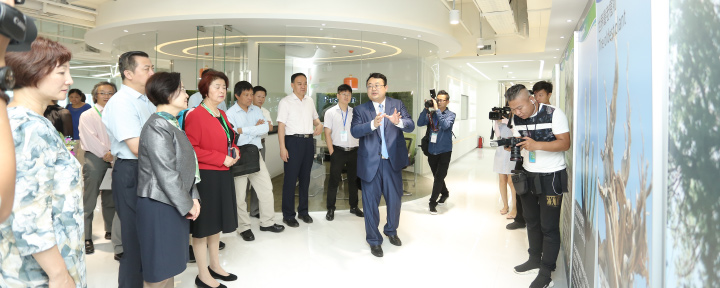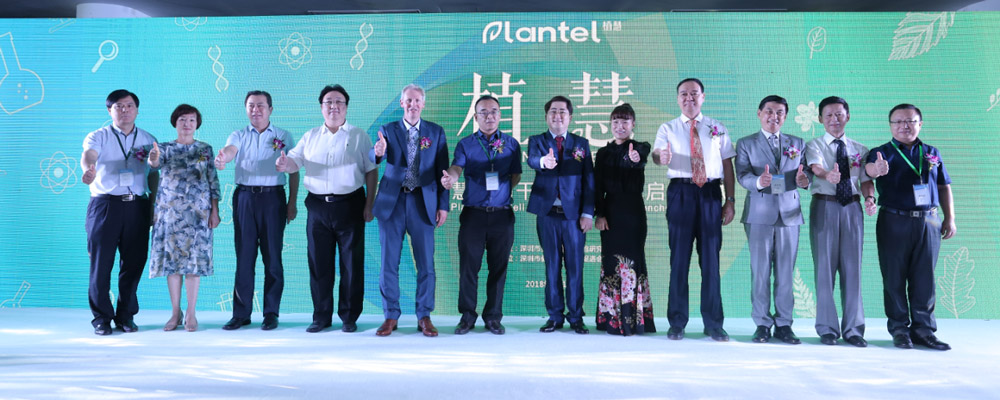The world's first 'plant stem cell bank (China)' officially operates in Shenzhen
On the morning of July 19, the “Plant Intelligence Plant Stem Cell Institute” was unveiled and the “Plant Stem Cell Bank (China)” launching ceremony (hereinafter referred to as “PIPSCI”) was held in Qiuxian Pavilion, Shenzhen Talent Park. Plant Intelligence Plant Stem Cell Institute (PIPSCI) is an NGO and NPO R&D institution with focus in plant intelligence and plant stem cell. It has integrated top R&D teams worldwide, including South Korea, the United Kingdoms, the United States, China, etc. PIPSCI is currently operating as the leading research and development institution in the field of plant intelligence and plant stem cell.
On the day of the event, there were plenty of people who attended the unveiling ceremony and launched the operation of the Plant Stem Cell Bank (China). They were Jiang Yuyang who is the Chairman of Shenzhen Science and Technology Association; Huang He, President of Shenzhen Health Industry Development Promotion Association/Shenzhen Health Association; Qiu Xuan, Secretary of Shenzhen Science and Technology Innovation Committee; Wang Zhiyi, Director of Shenzhen Economic Information and Trade Commission; Fang Wenchuan, Director of Food and Drug Administration; Tan Wei, Section Head of the Shenzhen Development and Reform Commission; Dr. Feng Shixiu from Shenzhen City Administration; Prof. Nai-Hong Chen from the Institute of Materia Medica, Chinese Academy of Medical Sciences; and President Liu Guozheng from the Chinese Medicine Magazine.

The Talents who in the field of plant stem cells gather in Nanshan
At the unveiling ceremony of PIPSCI, Eun Kyong Lee, the founder of the plant stem cell platform technology, was appointed as the President of the institute; and Young Woo Jin who is also one of the pioneers of plant stem cell platform technology, was appointed as the chief scientist. At the same time, Prof. Gary Loake who is from the University of Edinburgh, and Prof. Nai-Hong Chen who is from Chinese Academy of Medical Sciences were appointed as Deputy director, and several industry experts were academic consultants and industrial consultants.
Subsequently, Huang He, the president of Shenzhen Health Industry Development Promotion Association awarded PIPSCI the 'Executive Vice President', Prof. Li-Xing Lao who is from School of Chinese Medicine, University Of Hong Kong, Secretary General of Consortium for the Globalization of Chinese Medicine (CGCM), also awarded PIPSCI the title of 'the member unit of CGCM.
At the launching ceremony, PIPSCI also accepted donations from both Malaysian royal family member YAM Tengku Baharuddin and Yousing life and health technology management Limited for 1 million RMB each. And signed a strategic cooperation agreement with the University of Edinburgh. Also have signed agreements about entrusted formula research and industrialized mass production system consulting with Botan Life & Health Limited, Lifeade Biorech (Shenzhen) Limited and other company. Those leading companies in global relevant industry like Johnson & Johnson Innovation and Yiling Pharmaceutical has also sent representatives to attend the ceremony.

After the event, plenty of guests came to PIPSCI where locate in Shenzhen Bay Science and Technology Ecological Park in batches. They visited the R&D facilities and platforms, directly observed and touched the real undifferentiated plant stem cells. They have learned more about the difference and advantages between plant intelligent platform and platform technology such as field collection, agricultural planting, callus culture, indoor vertical farm, seed bank, gene bank, etc. They had a systematic understanding of the entire plant intelligence R&D platform by observing by video about the quality inspection system and industrialized production base which have already been built and put into production.

Creating the world's top R&D institutions by leading the core technology
PIPSCI is an NGO and NPO R&D institution with focus in plant intelligence and plant stem cell. It has integrated top R&D teams worldwide, including South Korea, the United Kingdoms, the United States, China, etc., and has established comprehensive R&D platforms and commercialization systems based on world's leading technologies in undifferentiated plant stem cell isolation, culture, multiplication, and optimization. PIPSCI is fully licensed of all related patents worldwide and is currently operating as the leading research and development institution in the field of plant intelligence and plant stem cell.
China's plant resources and traditional Chinese medicine culture are a huge treasure. Plant stem cell platform technology can excavate and develop the treasure well. There are huge similarities between the current status of many plant resources and oil reserve in Middle East 100 years ago: The resource is there, but people just don’t know how to develop and utilize it. The director of PIPSCI, Shijie Jin said, PIPSCI is going to “to dig the endless oil and mines” in a completely environmental and sustainable way, to allow the “plant intelligence” of China’s local plant resources and the great wisdom of Traditional Chinese Medicine shine even brighter.
It is reported that in combination with the international leading genomics, active ingredient analysis, engineering optimization, performance verification and other expert teams, PIPSCI has built a whole system of plant intelligence and plant stem cell research, basic research and development, application project research and development, industrial research and development and implementation platform. At present, PIPSCI is working closely with other leading organizations such as the University of Edinburgh, the Consortium for Globalization of Chinese Medicine(CGCM), etc. to construct the world‘s first plant stem cell bank(China), and create a scientific and systematic supporting platform in fundamental science research as well as industrialization and commercialization, to protect and develop Chinese plant resources with best efforts, and promote modernization of Traditional Chinese Medicine.
The first plant stem cell bank in the world opened in Shenzhen
Plants have been quietly contributing their own intelligence and strength to human beings for hundreds of millions of years. With the increasing living standards of the people, the way of collecting plant resources such as wild collection and agricultural planting has been unable to satisfy people's yearning for a better life. Vertical farms New technologies are becoming more and more popular and popular, but they are limited to vegetables with short growing seasons. Many rare active ingredients derived from plants have proven to be excellent, but they have not been able to solve the standardized mass production of related ingredients. The problem, 'only the last mile' 'can’t walk out of the laboratory.'
With the launch of the world's first plant stem cell bank, the platform will systematically collect and preserve the plant resources of the “Chinese legendary plant individual”. Based on the “plant intelligence protection platform”, the core unit of the best individual plants will be preserved and the endangered plants will be built. The living stem cell bank permanently preserves all the genetic information of the plant, and carries out research and development and industrialization, so that the most excellent plant intelligence can be free from time and space and become a treasure trove of human resources.
It is reported that the “seed bank” that people are familiar with preserves the “next generation” of plants; while the “plant stem cell bank” can preserve the undifferentiated stem cells of the most legendary plant individuals as they are,
and preserve the objects. The 'plant stem cell bank' can preserve the undifferentiated stem cells of the most legendary individual plants as they are, and the preserved objects can be refined to individual organisms (such as 'Peng zu in wild ginseng, Einstein in yew', etc.). Since many plant individuals have lived for thousands of years, if their stem cells are separated and preserved, then you can truly realize 'Shen Nong's / Li Shizhen, us, our children and grandchildren, up and down five thousand years, sharing a tree, one Plant grass is of great significance for the protection and utilization of endangered plant resources.

Crack the mystery of plants forever
Botanical research and development usually has problems such as long cycle and low standardization. To engage in botany research, compared with other biological disciplines, to be more “withstand loneliness, withstand the test”. The PIPSCI, which carries the “Plant Intelligence Decryption Platform”, provides a highly efficient and standardized R&D system for researchers, not only to quickly and systematically acquire a complete database of gene transcription and active ingredients, but also to provide Fully standardized test samples, and shorten the test period that originally took months or even years to a few days, so that the biochemical synthesis pathway can be confirmed very efficiently, and the core secrets of how plants last forever, why they are effective, etc. .
It is understood that the “plant intelligence enhancement platform” is to build a large-scale cell culture and production base, using the highest-standard “safe, stable, standardized” production system, fundamentally breaking the limitations of time and space, “more, faster, better”, The province produces a variety of rare natural active ingredients.
At present, PIPSCI has established a standardized mass production platform for the active ingredients of wild ginseng and yew, through the industrialized incubation platform such as Zhihui Technology. It can be produced every month in a production space of several thousand square meters. It is the active ingredient that can be obtained after several decades of growth on the land equivalent to several thousand hectares, and there is no bacteria, no
pesticides, no heavy metals in the whole process. The active ingredients of each batch are strictly standardized, and the plant intelligent programming can also be “Orientation optimizes the target ingredients to achieve customization of natural composite ingredients.”
Looking forward to the future, PIPSCI is an open and innovative ecosystem for the plant intelligence industry. With Shenzhen as the core, we will work together with upstream and downstream R&D institutions and enterprises to create R&D across the country and the world. The ecosystem of production and channels, guiding and assisting more enterprises and high-end talents to connect with the platform of PIPSCI, all-round help Chinese medicine to break through the predicament of “there is no medicine, no medicine, no effective standard” worldwide.